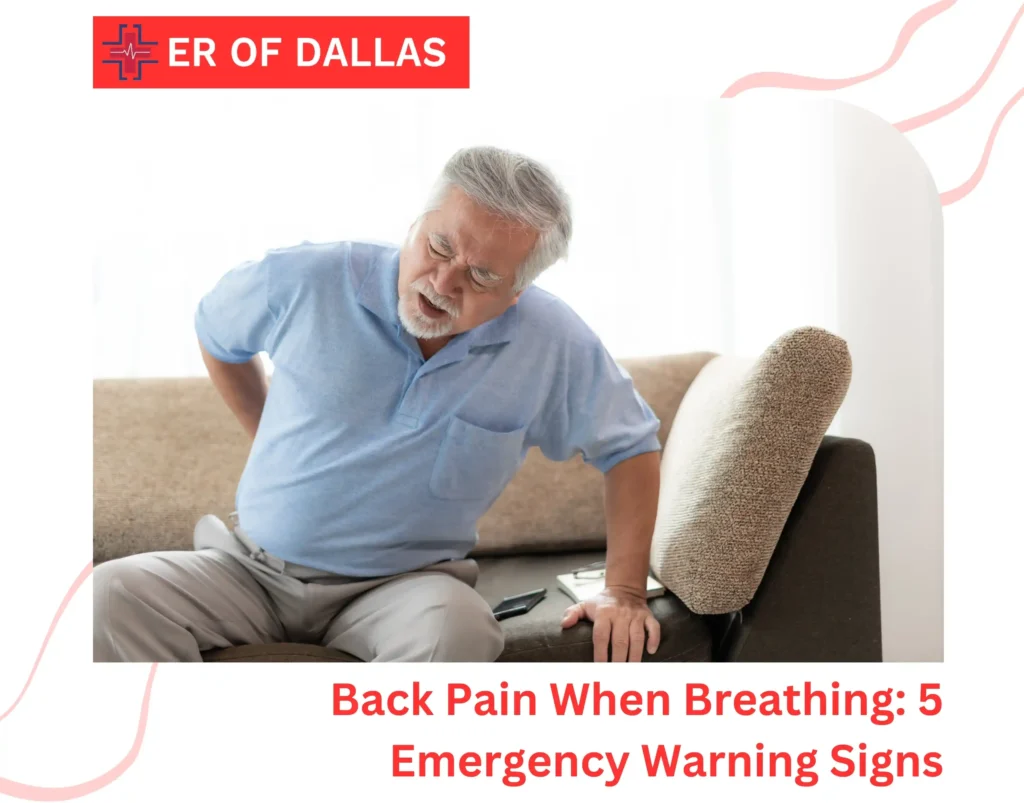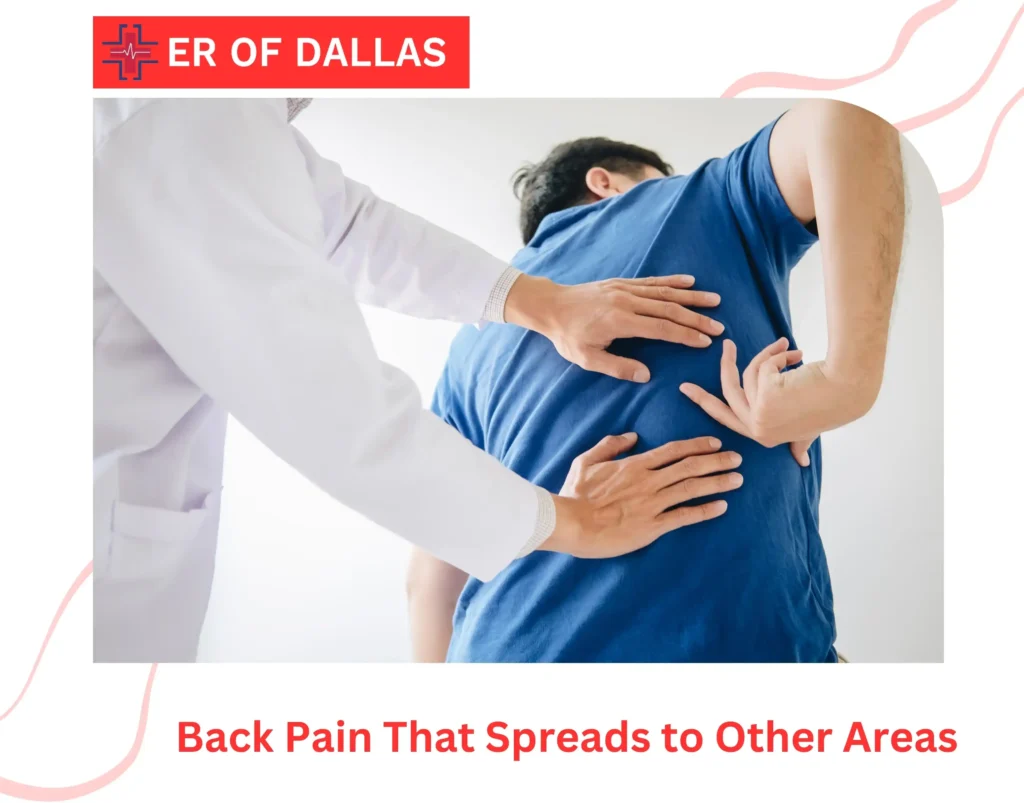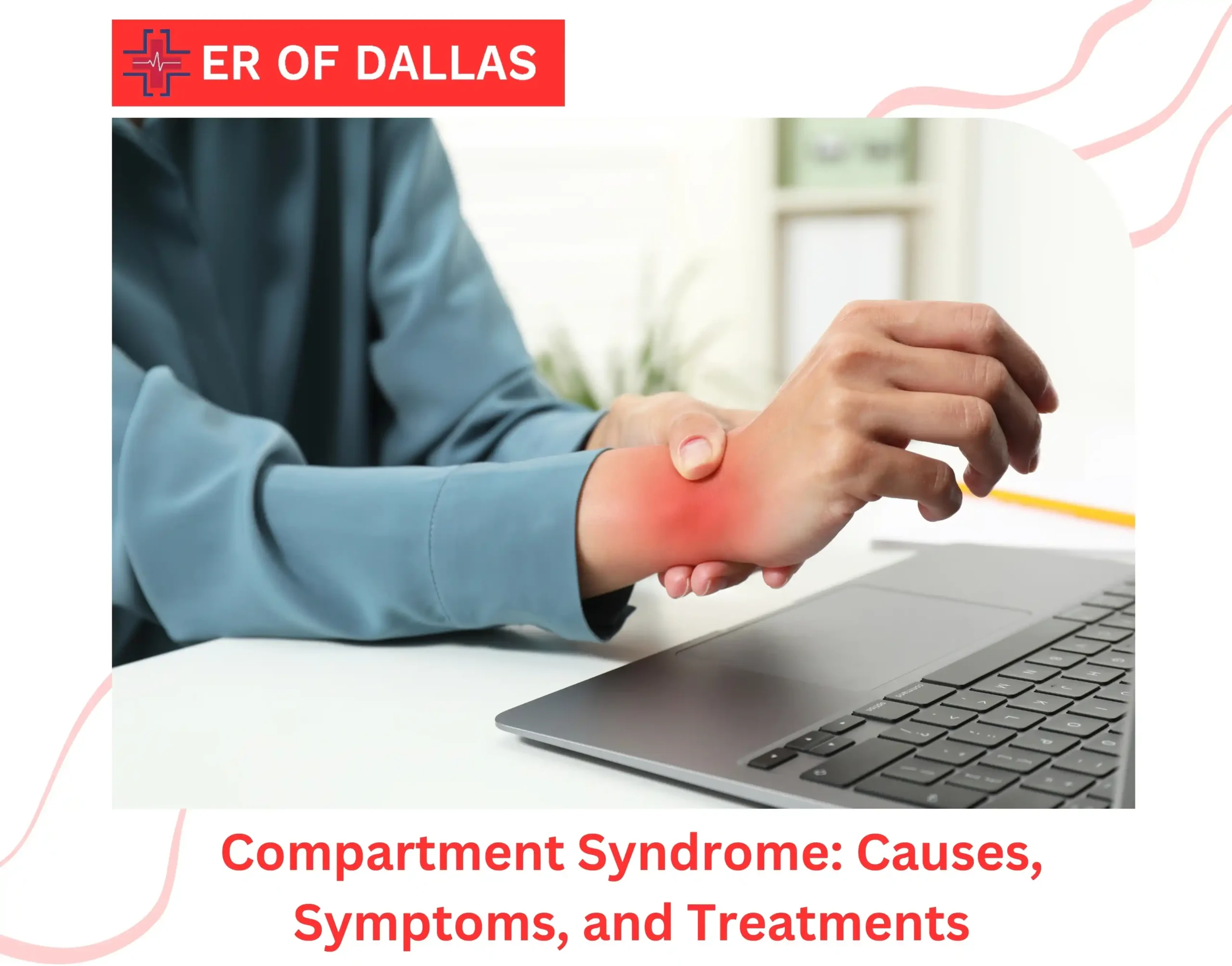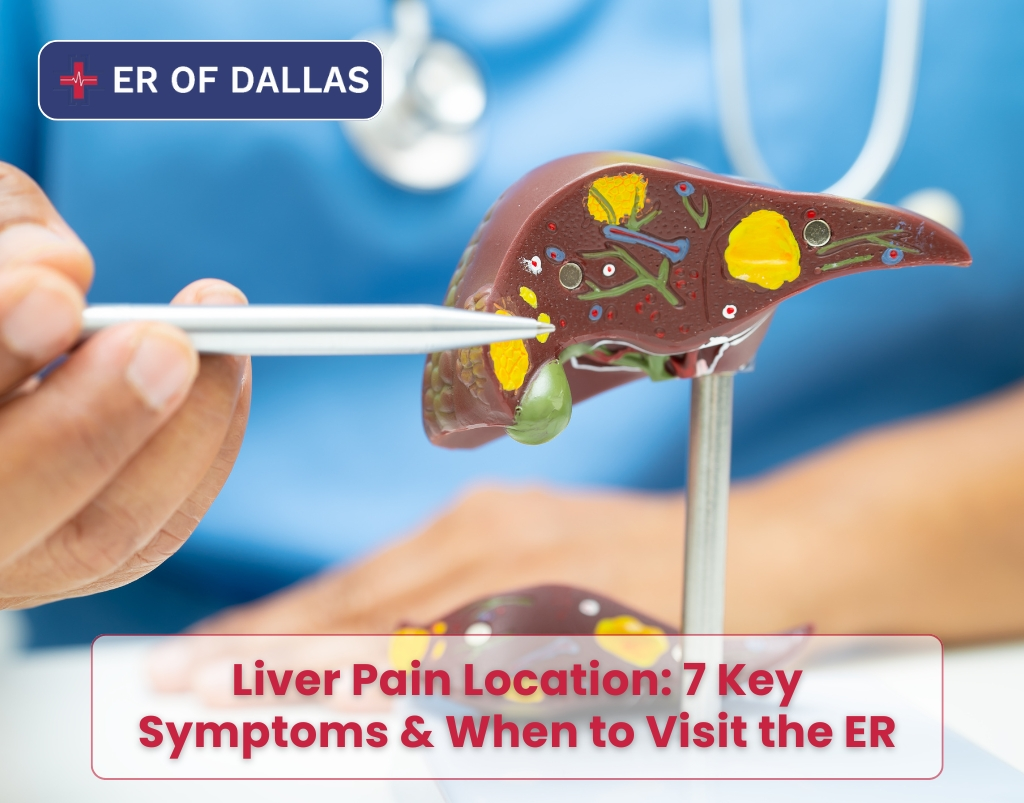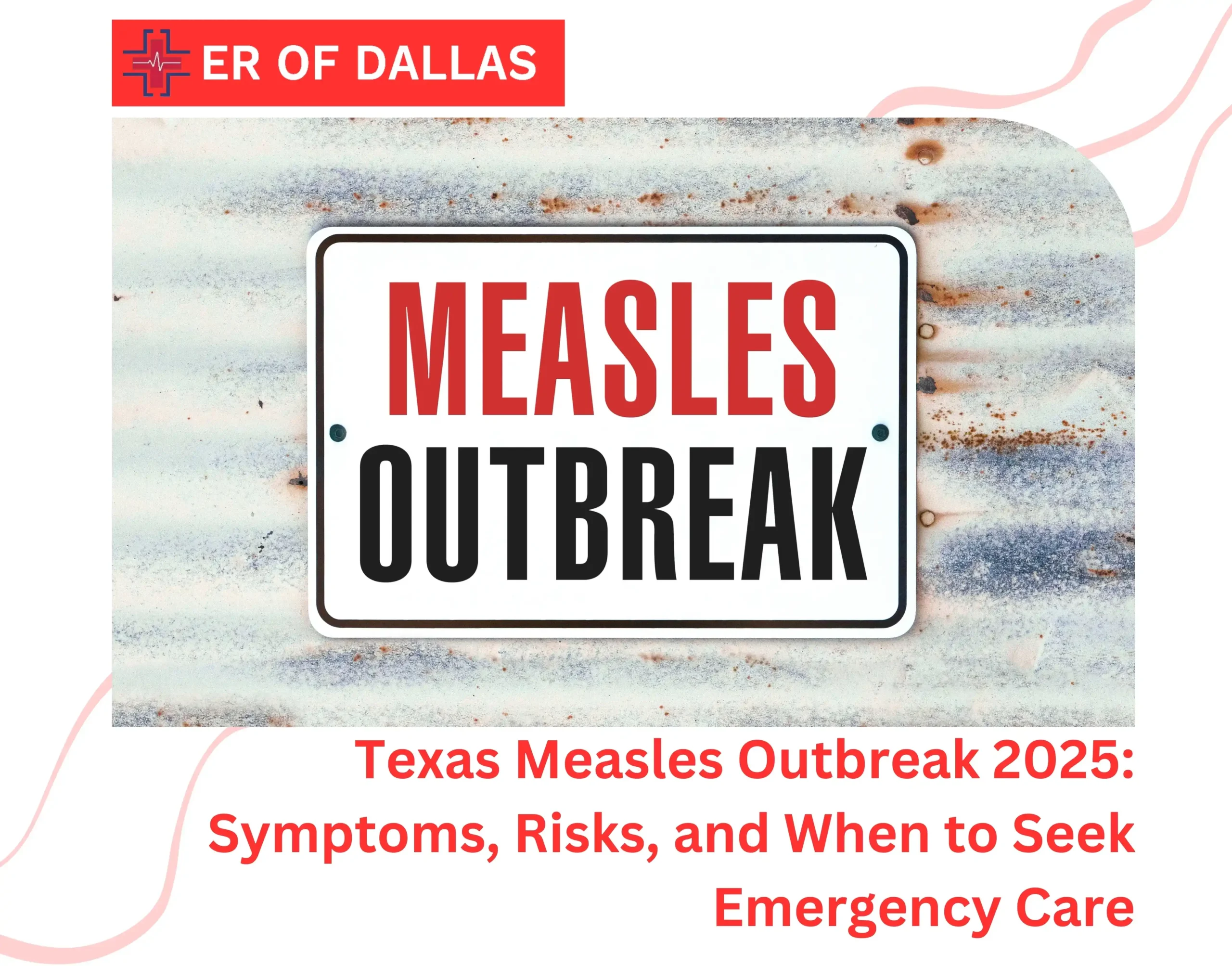Your back hurts while breathing. You assume it’s just a strain from the gym. You keep brushing it off until one night, you wake up gasping for air. Do you want this to happen to you or someone you love?
Of course not. Back pain when breathing is your body’s warning signal. It often points to something more serious than sore muscles, potentially injured lungs or even a heart attack that demands immediate attention.
Specific symptoms reveal when it’s not just routine muscle strain. At Dallas ER, we regularly treat patients who could have avoided hospital stays and even surgery if they had sought emergency care at the first sign of back pain when breathing. Understanding these five critical symptoms help you make informed decisions about when to seek proper medical care.
Back Pain When Breathing: 5 Emergency Warning Signs
When you have back pain when breathing, here are five symptoms to watch out for and what they might indicate:
Sharp, Sudden And Persistent Back Pain
A sharp, stabbing pain in your back every time you breathe could be more than just a pulled muscle. It may be linked to:
- Pleurisy: Pleurisy is inflammation of the pleura, the membrane surrounding the lungs. When inflamed layers rub against each other they cause sharp chest pain that worsens with breathing. The pleura extends to the back of the chest, so the pain may travel to the upper or middle back.
- Pulmonary Embolism: A pulmonary embolism (PE) is a dangerous blood clot in the lungs. The clot blocks blood flow and reduces the oxygen supply. As the lungs struggle to get oxygen, pressure builds up, and pain radiates to the chest, upper or middle back.
- Collapsed Lung (Pneumothorax): Pneumothorax happens when air leaks into the space between the lung and chest wall, causing the lung to collapse. You struggle to breathe which puts extra strain on back muscles.
Back Pain With Shortness of Breath
If your back pain aches and you can’t breathe easily, you may have a lung or heart problem. The potential causes include:
- Pneumonia: A lung infection that causes fluid buildup in the air sacs (alveoli), turning every breath into a struggle. Excess fluid in the lungs also causes coughing that strains the chest and back muscles and causes back pain when breathing.
- Heart Attack: A heart attack happens when a blockage in the arteries reduces or stops blood flow to the heart. The nerves in the heart and upper back are connected, so heart pain can sometimes feel like back pain.
- Pulmonary Embolism: The clot prevents blood from picking up enough oxygen in the lungs, causing sudden shortness of breath.
Back Pain That Spreads to Other Areas
Back pain that moves to your chest, arms, shoulders, or neck could signal a serious underlying issue. Possible causes include:
- Aortic Dissection: This happens when the inner layer of the aorta (the main artery carrying blood from the heart) tears. The tear can reduce blood supply to the spine and surrounding muscles. A ripping or stabbing sensation is felt in the back that radiates to the neck, jaw, stomach, or legs. Severe chest or back pain along with difficulty breathing is a key indicator of aortic dissection.
- Kidney Problems: Kidney infections can cause sharp, intense lower back pain or side pain, sometimes spreading to the abdomen, and groin. Pain can feel worse when trying to take deep breaths.
- Heart Attack: When the heart isn’t getting enough blood, other body parts, including the muscles in the back, also feel tense or achy.
Also Read: Signs Your Chest Pain Is Not a Heart Attack
Back Pain That Comes with Fever, Chills, or Cough
You may have any of the following infections if your back hurts when you breathe and you have fever, chills, or a persistent cough:
- Spinal Infection: A spinal infection happens when bacteria or fungi invade the spine, cause swelling, or pressure on the nerves. This can lead to intense back pain that gets worse with movement and breathing. Your immune system responds by raising your body temperature to fight infection. The result is fever, chills, and also cough if it spreads to the lungs.
- Tuberculosis (TB): This bacterial infection usually affects the lungs but can also spread to other parts of the body, including the spine, and cause back pain. TB causes a strong, constant cough that can strain back and chest muscles.
- Pneumonia: Pneumonia causes fever, chills, and cough because your body is fighting off an infection in the lungs.
Back Pain that Worsens With Movement
Your back aches when you breathe and it gets worse when you change posture. This may indicate:
- Rib Fractures or Bruises: Fractured or bruised ribs can cause severe pain that worsens with breathing, coughing, or deep breaths.
- Herniated Disc: A slipped disc, where the disc material leaks out and puts pressure on nerves. When nerves are irritated, the back muscles tense up as a protective response. This leads to stiffness and pain with any motion.
- Scoliosis: Scoliosis (abnormal spine curvature) exert pressure on the ribs, lungs, and surrounding muscles. The lung space is reduced, so deep breaths feel painful. The uneven spine also puts strain on the back and chest muscles, making them sore, especially when you move.
Breathing Pain Demands Immediate Attention
Conditions like aortic dissection and heart attack can be deadly if not treated quickly. You never know if your back pain while breathing is coming from a serious issue deep inside your body. That’s why it’s always best to get checked the moment you notice any of the above symptoms.
Dismissing these warning signs can transform a treatable condition into a life-threatening emergency. Our emergency physicians have specialized training to quickly distinguish between minor muscle strains and serious medical conditions when you experience back pain when breathing. Don’t hesitate to seek emergency care because your health and safety come first.
FAQs
1. Why does it hurt when breathing?
The muscles between your ribs (intercostal muscles) help your chest expand and contract when you breathe. If these muscles are strained, they can feel irritated with every breath, causing pain. Since deep breaths involve your back muscles, so if any of them are injured, breathing can become uncomfortable.
2. Can back pain when breathing go away on its own?
Yes, if muscle strain, poor posture, or minor irritation is the cause, back pain usually improves on its own with rest, heat, and gentle movement.
3. How do I know if my back pain when breathing is serious?
Back pain when breathing needs medical attention if it’s sharp, sudden, or comes with difficulty breathing. Seek help if your back pain radiates to other areas, appears with fever, follows an injury, or disrupts your sleep. Mild back pain that gradually improves without other symptoms is typically less concerning.


